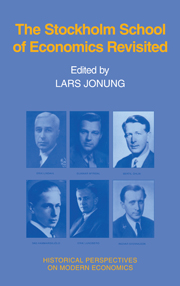Book contents
- Frontmatter
- Dedication
- Contents
- Preface
- List of Contributors
- Dramatis Personae at the end of 1937
- Introduction and Summary
- Part I The roots
- Part II The approach of the Stockholm School
- Part III The impact of the Stockholm School
- 15 The Swedish influence on Value and Capital
- 16 The London School of Economics and the Stockholm School in the 1930s
- Comment
- 17 Thoughts on the Stockholm School and on Scandinavian economics
- 18 Ragnar Frisch and the Stockholm School
- 19 The late development of the Stockholm School and the criticism from John Åkerman
- Part IV What remains of the Stockholm School?
- The Stockholm School: A non-Swedish bibliography
Comment
Published online by Cambridge University Press: 05 July 2013
- Frontmatter
- Dedication
- Contents
- Preface
- List of Contributors
- Dramatis Personae at the end of 1937
- Introduction and Summary
- Part I The roots
- Part II The approach of the Stockholm School
- Part III The impact of the Stockholm School
- 15 The Swedish influence on Value and Capital
- 16 The London School of Economics and the Stockholm School in the 1930s
- Comment
- 17 Thoughts on the Stockholm School and on Scandinavian economics
- 18 Ragnar Frisch and the Stockholm School
- 19 The late development of the Stockholm School and the criticism from John Åkerman
- Part IV What remains of the Stockholm School?
- The Stockholm School: A non-Swedish bibliography
Summary
Shehadi succeeds in capturing an important aspect of the spirit of LSE in the 1930s. Those who had the good fortune to start their careers there will agree that it was a place of unique intellectual excitement. I remember the day I was appointed Assistant Lecturer. Lionel Robbins took me to the Senior Common Room, saying “You are now entering a republic – we're all equal here. Make yourself at home.” I was warmly greeted by the assembled company – Beveridge, Bowley, Tawney, Dalton, Postan, Laski, Eileen Power, Hogben. There would never be a dull moment in that Common Room.
Inside the Economics Department there was plenty of excitement. Robbins had become Chairman at the age of thirty and, with energy and enthusiasm, he was determined to make LSE a leading center of economic theory. It is important to recall that there were two battles going on. The director of LSE, Sir William Beveridge, was strongly opposed to Robbins's emphasis on pure theory against empirical work. As Shehadi points out, it was “… Beveridge's insensate hostility to pure theory” that caused John Hicks to leave LSE for Cambridge in 1935. On this front Robbins had the support of his colleagues and was bound to win. This was not true of his other ambition – to hitch LSE's wagon to the Viennese star. Even before 1936 it was evident that this battle he was bound to lose.
- Type
- Chapter
- Information
- The Stockholm School of Economics Revisited , pp. 389 - 390Publisher: Cambridge University PressPrint publication year: 1991
- 2
- Cited by



